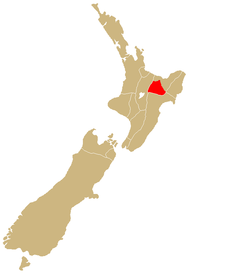 Approximate area of the Urewera mountain range | |
| Date | 15 October 2007 |
|---|---|
| Location | Ruatoki and various other locations around New Zealand |
| Arrests | 18 |
| Charges | Unlawful possession of firearms and other weapons under the Arms Act 1983 |
| Convictions | 4 |
The 2007 New Zealand police raids were a series of armed police raids conducted on 15 and 16 October 2007, in response to alleged paramilitary training camps in the Urewera mountain range near the town of Ruatoki.[1][2][3] About 300 police, including members of the Armed Offenders Squad and Special Tactics Group, were involved in the raids, which involved the execution of search warrants at various addresses throughout New Zealand, and the establishment of roadblocks at Ruatoki and Tāneatua. The police seized four guns and 230 rounds of ammunition and arrested eighteen people.[4][5] According to police, the raids were a culmination of more than a year of surveillance that uncovered and monitored the training camps.[6]
The police were investigating potential breaches of the Terrorism Suppression Act.[7] On 8 November 2007 the Solicitor-General, David Collins, declined to press charges against any persons under that legislation.[8] Collins later described the legislation as "incoherent and unworkable", and said it was almost impossible to apply to domestic terrorism in New Zealand as it was too complex.[9] According to then Prime Minister Helen Clark, one of the reasons police tried to lay charges under anti-terror legislation was because they could not use telephone interception evidence in prosecutions under the Arms Act.[10]
The raids were highly controversial and their legitimacy was debated by politicians, the media and the public.[6] Hundreds of people participated in protests across New Zealand in the weeks following the raids.[11][12] Of the eighteen people arrested, just four came to trial in February and March 2012, including Ngāi Tūhoe activist Tāme Iti.[2] The defendants were found guilty on firearms charges. On the more serious charges of belonging to an organised criminal group, the jury was unable to agree.[13] In March 2012, the cost to the taxpayer of the criminal proceedings, including legal aid and prosecution costs, was estimated to be well over NZ$6 million.[14] The cost of the surveillance and the subsequent raids had previously been estimated to be over NZ$8 million.[15]
In May 2013, the Independent Police Conduct Authority (IPCA) published a report of its findings and recommendations following the investigation of complaints by individuals and organisations about police actions during the raids, particularly relating to road blocks and the execution of search warrants. The IPCA concluded that although the planning and preparation for the execution of search warrants was largely in accordance with policy, the planning and preparation for the establishment of road blocks in Ruatoki and Tāneatua was "deficient" and a number of aspects of the police raids were "contrary to law and unreasonable".[16] The police spokesman for the Labour Party, which had been in government at the time of the raids, acknowledged that innocent people had been "unnecessarily frightened and intimidated".[17] In 2014 the Police Commissioner formally apologised to the Ruatoki community and Ngāi Tūhoe for police actions during the raids.[18]
- ^ IPCA 2013, p. 8.
- ^ a b "'Anti-terror' raids in Urewera". New Zealand History. Manatū Taonga, the Ministry for Culture and Heritage. 7 September 2020. Retrieved 19 January 2021.
- ^ Haunui-Thompson, Shannon (13 October 2017). "Ten years on from the Urewera raids". Radio New Zealand. Retrieved 19 January 2021.
- ^ Taylor, Phil (16 November 2007). "Terror raids - charges linked to just 4 guns". The New Zealand Herald. Retrieved 19 January 2021.
- ^ Savage, Jared (6 September 2011). "Ureweras case 'destroyed relationships'". The New Zealand Herald. Retrieved 27 January 2021.
- ^ a b Johnston, Tim (22 October 2007). "Anti-terror raids cause turmoil in New Zealand". New York Times. Archived from the original on 21 September 2017. Retrieved 19 January 2021.
- ^ IPCA 2013, p. 4.
- ^ "TIMELINE: Police raids". TVNZ. 8 November 2007. Retrieved 19 January 2021.
- ^ "Act too complex to use, says Collins". Stuff.co.nz. 31 January 2009. Retrieved 19 January 2021.
- ^ Trevett, Claire; Binning, Elizabeth (12 November 2007). "Wider phone tapping considered". The New Zealand Herald. Retrieved 19 January 2021.
- ^ "Hundreds protest against terror raids". The New Zealand Herald. 19 October 2007. Retrieved 26 January 2021.
- ^ "Nationwide protests against anti-terror op". Sunday Star-Times. 27 October 2007. Retrieved 28 January 2021.
- ^ IPCA 2013, p. 14.
- ^ Norquay, Kevin; Robinson, Victoria; Levy, Danya (22 March 2012). "Urewera costs $6m and climbing". Stuff.co.nz. Retrieved 19 January 2021.
- ^ Lose, Joseph (21 October 2007). "Top Maori were terror targets". Sunday News. Archived from the original on 22 October 2007. Retrieved 29 January 2021.
- ^ IPCA 2013, p. 6.
- ^ Chapman, Kate (22 May 2013). "Urewera raids 'damning', of 'deep concern'". Stuff.co.nz. Retrieved 31 January 2021.
- ^ Mankelow, Natalie (13 August 2014). "Police apologise to Tuhoe over raids". Radio New Zealand. Retrieved 29 January 2021.